Especially since most of us sit all day hunched over a computer screen we need to stretch and open up before we workout. We need to do Dynamic Stretches.
Dynamic Stretches are stretches in which you work through a range of motion. They aren’t stretches that you hold. You are moving and allowing everything to warm up as you improve your joint mobility.
These stretches help open up our posture and return our body to proper alignment after sitting all day, which helps us prevent injury when we workout.
However, all too often, people skip their warm up and go straight into their workout, especially when they are going for a run. They figure they will “warm up as they go.”
But it doesn’t work that way.
Without correcting some of the dysfunction we create from sitting all day and warming up our joints through a proper range of motion, we can’t run as fast and we risk getting injured.
Below are 10 Dynamic Stretches for Runners that will help you prevent injury and get your body ready to run so that you can run faster with better form!
10 Dynamic Stretches for Runners
All of these moves can be done right before you hit the road or trail. Because all too often, we skip stretching before a run because the stretches we are supposed to do require us to get down on the ground.
All of these stretches can be done standing on or alongside the trail.
If you are inside, you may want to check out these 15 Dynamic Stretches as well since some are great to open up your body, but require you to get down on the ground, which isn’t as doable when you are outside about to run.
1. 3-Way Shin Stretch – Shin Splints are a common running injury. Loosen up your shins before your run with this three-way shin stretch.

To do the 3-Way Shin Stretch, stand facing a pole, tree or even park table or bench. Place your hands on the support in front of you with one foot back. Point the toe of the foot that is back and lay the top of your foot on the ground. Then bend your knee back and feel a stretch up your shin.
Complete 10 reps. Then change the angle of your toes.
You can point your toes straight back, in toward your other foot or outward. To point them outward, you will rock more onto your big toe. With your toes pointing each of the three ways, bend your knee forward to feel a stretch down your shin. Complete 10 knee bends in each position.
2. Standing Alternating Sides Hamstring Stretch – Tight calves and hamstring pulls are common annoyances. Stretch out both your calves and your hamstrings with this move.
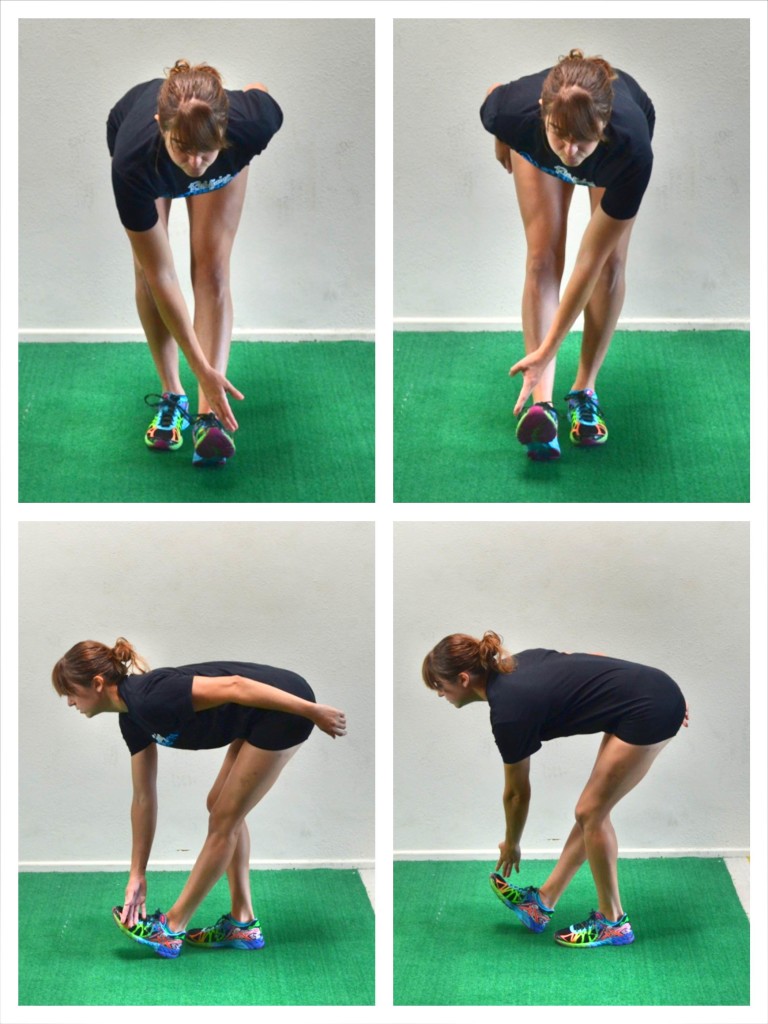
Stand tall with your feet together. Then step one foot a few inches forward and rock back on your heel.
Keeping that front leg straight, sit your butt back and reach your opposite hand down and toward the outside of your foot. Hold for a second then step the foot back and switch to the other side.
Make sure you keep that front leg straight and sit back as you reach the hand toward the outside of the foot.
3. Standing Quad Stretch and Reach – After sitting all day hunched over a computer screen, your chest and hips are tight. This stretch will open up your entire frontside.
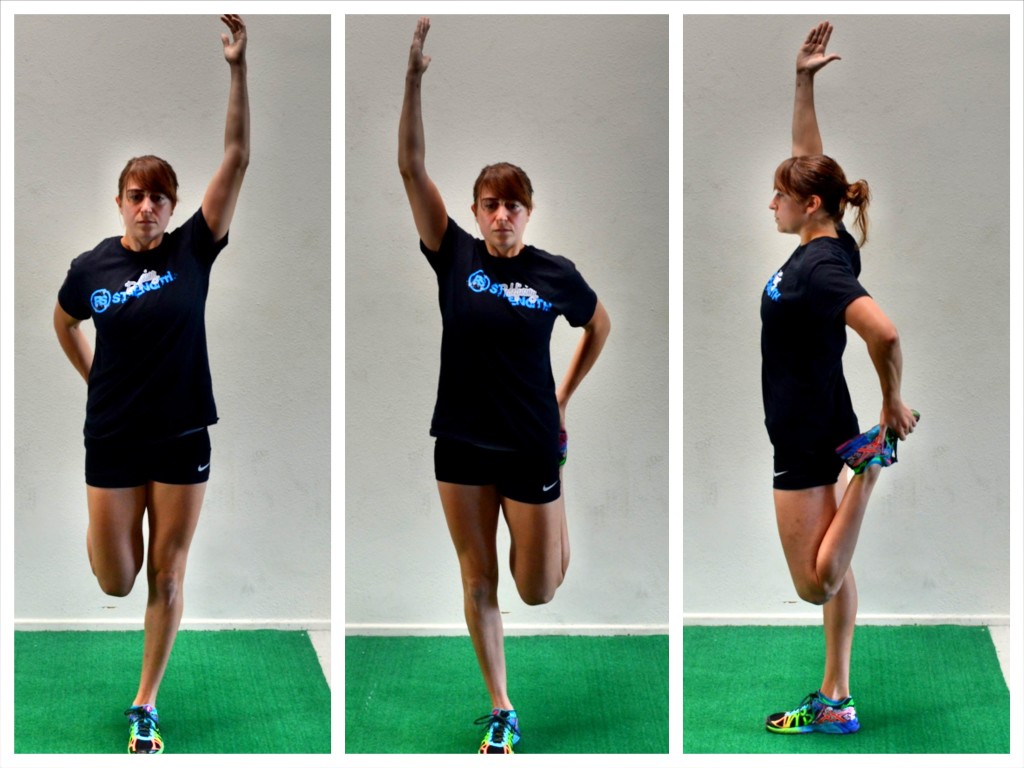
Stand tall with your feet together. Then reach your right hand down and grab your right foot, pulling the foot back up toward your butt. Stay nice and tall with your knee pointing straight down toward the ground.
Reach your left hand up toward the ceiling as you pull your heel toward your butt. Then take a few steps forward, or standing in place, switch and grab the left foot as you reach the right hand overhead. Make sure to stand up nice and tall as you stretch.
4. Side-to-Side Lunge – All too often people’s inner thighs are tight, which causes their knees to go inward (this can also be a sign of glute weekness.) Stretch out your inner thighs with these lateral lunges.
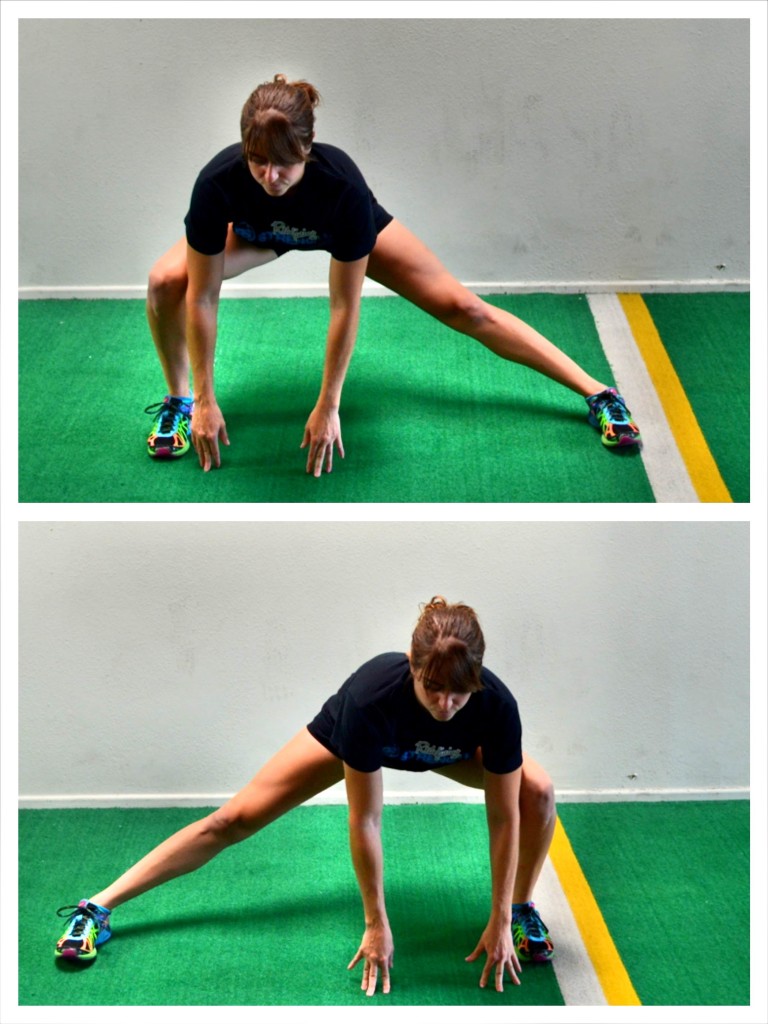
Stand with your feet wider than shoulder-width apart and your toes both pointing straight ahead. Bend your right knee and sink your butt down to the right. Keep both heels down and your left leg straight. You can place your hands on the ground if you want.
Then, keeping your butt low, slide across into a low lunge on the other side. Your left knee will bend as your right leg straightens. Both heels should stay down and your butt should stay low.
Hold for a second on each side before sliding back across. Stay low until all reps are complete.
5. Crescent to Hamstring Stretch – Dynamic stretches are a great way to warm up because they not only improve your mobility and flexibility but also get everything warm and working before you run. This stretch will open up your hips and stretch your hamstrings while also making those legs start working. Reaching up overhead will also open up your upper body after sitting all day.
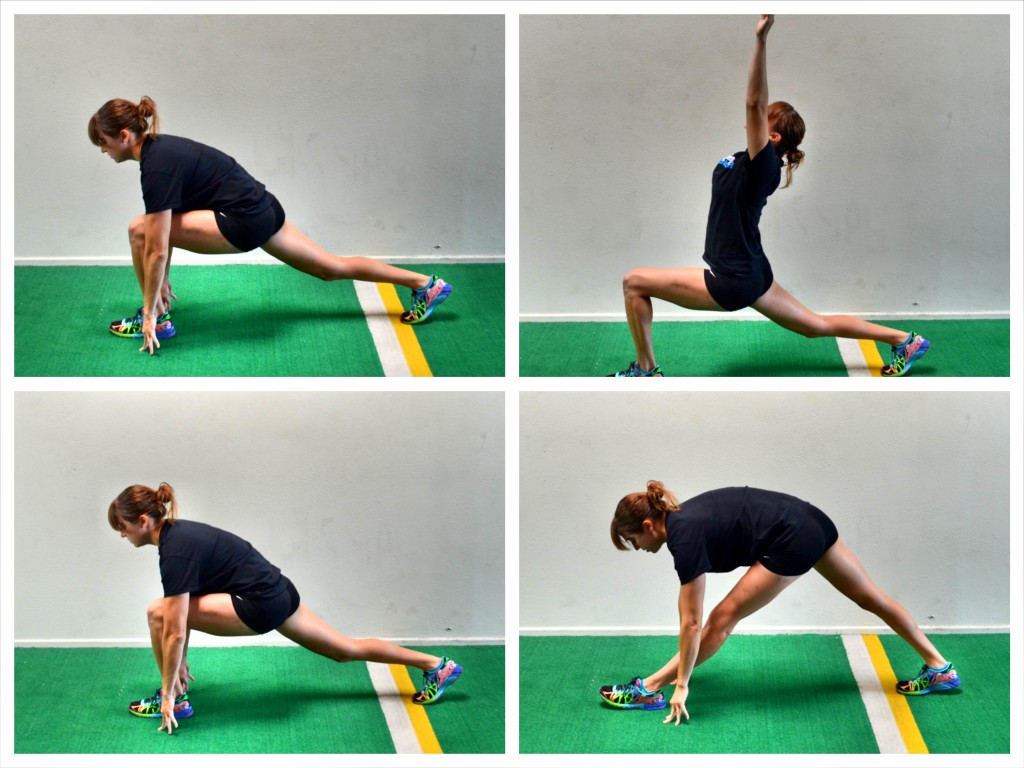
To do the Crescent to Hamstring Stretch, step one foot back into a nice wide stance with the back heel up. Bend your front knee and place your hands on the ground on either side of your foot. Keep your back leg straight in the low lunge.
Then, staying in a nice low lunge, reach your hands up and back overhead.
Hold for a second or two then place your hands back down on the ground.
With your hands down on the ground, straighten your front leg and lean over to stretch your hamstring. As you straighten your front leg, you may want to drop your back heel down to the ground. Then bend the knee back into the low lunge and repeat.
Complete all reps on one side before switching.
6. Standing IT Band Stretch and Reach – A tight IT Band, hip and glute can cause a variety of problems for runners. This stretch will help you loosen up down the outside of your leg and hip and prevent injury.

To do the Standing IT Band Stretch and Reach, cross one foot behind the other and line up both feet so your toes are even. This will keep your back leg straight so that you get a better stretch. Reach up with both hands and feel a nice stretch.
Then hinge over and reach your hands to the ground down outside the instep of your back foot. Push your hip away from the foot you are reaching toward to feel a nice stretch down the side of your leg and even glute.
Hold for a second or two then uncross your feet and recross them the other way. Reach up again and then reach down toward the instep of the back foot.
Keep alternating feet and reaches to stretch both sides. Make sure your toes are even and that you reach toward the instep of the foot in back.
7. Standing Glute Stretch – Stretch the outside of your butt and hip with this stretch. You may even feel it down the outside of your thigh.
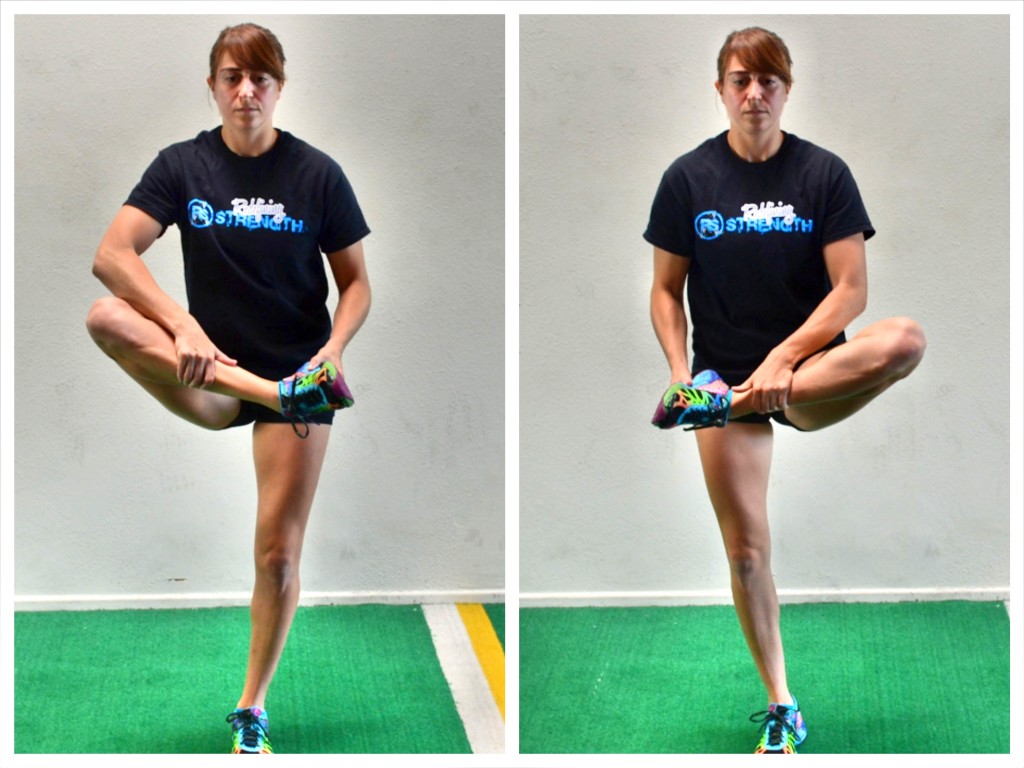
Stand tall with your feet together. Then grab your right foot with one hand and the lower leg with the other. Pull the foot up toward your chest and let your knee drop open. Feel the stretch in the outside of your glute and hip.
Then release and pull the other foot up and in as you let the knee drop open. Keep alternating sides until all reps are complete. Stand up nice and tall as you pull the foot up and in. If you really feel it in your knee, flex your foot.
8. Hurdles – A great move to open up the hip through a range of motion. Plus hurdles also wake up your feet and lower leg because you have to balance on one foot.
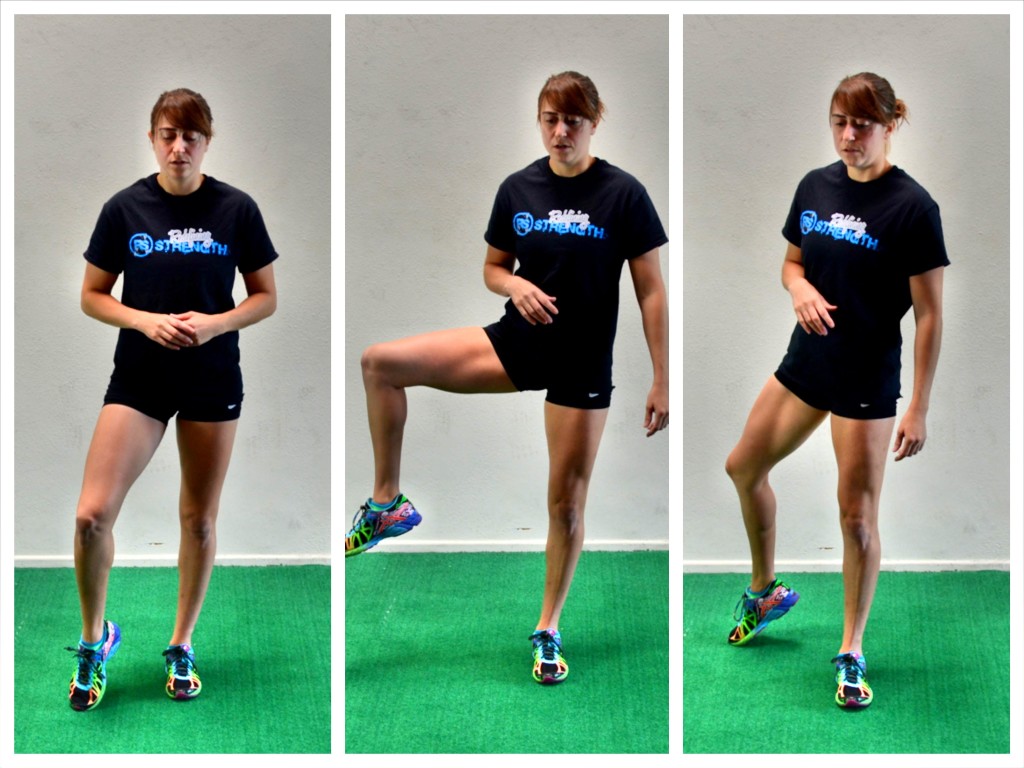
To do hurdles, stand on your left foot with your right foot lightly touching the ground. Lift the foot up then back and over as if stepping over a fence.
Touch your foot down then lift it back up and over to the front. Keep lifting the leg up and over until all reps are complete.
Try to get the knee up as high as possible as you lift over. Also make sure you step back and over. Don’t just lift straight up and down.
9. Standing Side and Overhead Reaches – Because we sit all day our upper body, especially our lats, can be tight. And a tight upper body can mean bad posture when you run plus upper back, neck and shoulder pain.

To do this upper body stretch, stand with your feet about shoulder-width apart. Place one hand down on your leg at about the outside of your knee. Reach the other hand up and over. Hold for a second and feel a stretch down your side.
After holding, come back up to standing and reach both hands up overhead. Then place the other hand on your leg and reach the other way to stretch down your side. Keep alternating sides, reaching up center in between each time.
10. Dynamic Chest Stretch – Our chest gets tight from hunching over a computer all day and if we want to maintain good posture when we run, we need to stretch it out!

Stand with your feet a little wider than shoulder-width and bend your knees to come into a little squat. Reach your hands up overhead then slowly bring them down and out almost as if you are making a snow angel.
As you bring your hands down and out, make sure you press your chest out and pinch your shoulder blades down and back. Then reach back overhead and repeat.
 As you bring your hands down really focus on pressing your chest out and spreading your arms out wide and even a little behind you.
As you bring your hands down really focus on pressing your chest out and spreading your arms out wide and even a little behind you.
BONUS:
Bridges: A great move that every runner should be doing is the bridge, be it a glute bridge, table top bridge or the camel. A bridge exercise will activate their glutes while also stretching their hips and even their chests to help prevent hip, knee, back, neck, and shoulder pain. Here are five bridge variations you need to include in your routine even if you don’t do them right before a run.
Mini Band Moves: Many injuries that runners face could be prevented or corrected by strengthening their glutes. These mini band moves are a great way to activate the glutes to prevent injury!
And for some great static stretches to do after your run, try these exercises. Or check out this greatrecovery workout for runners!



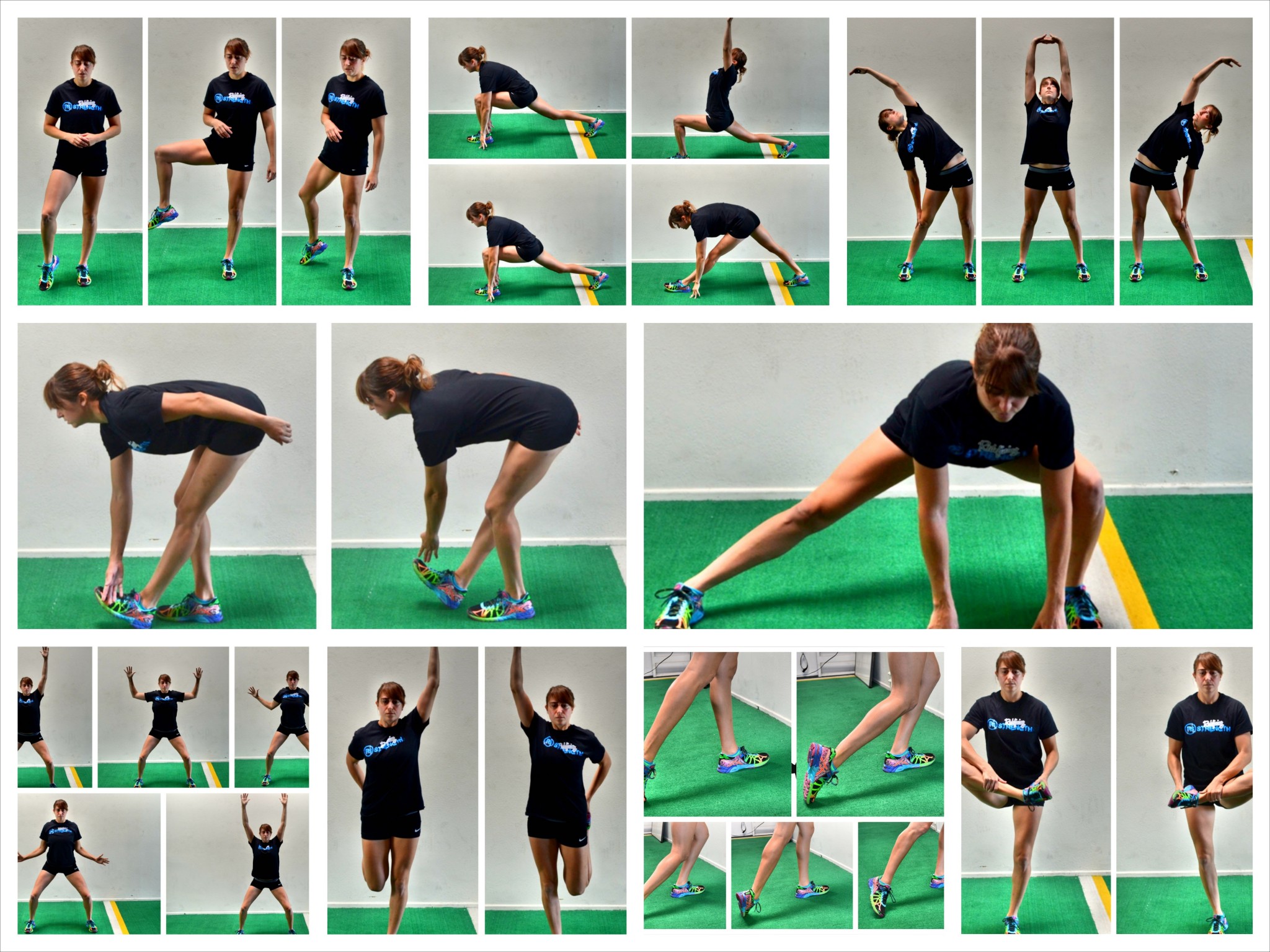
No hay comentarios.:
Publicar un comentario